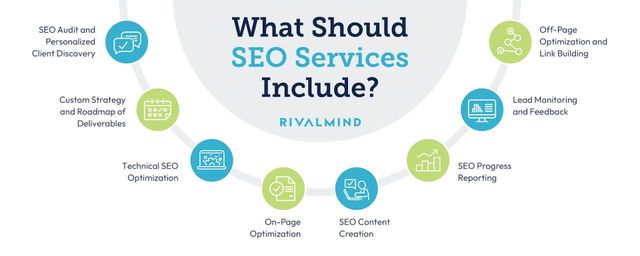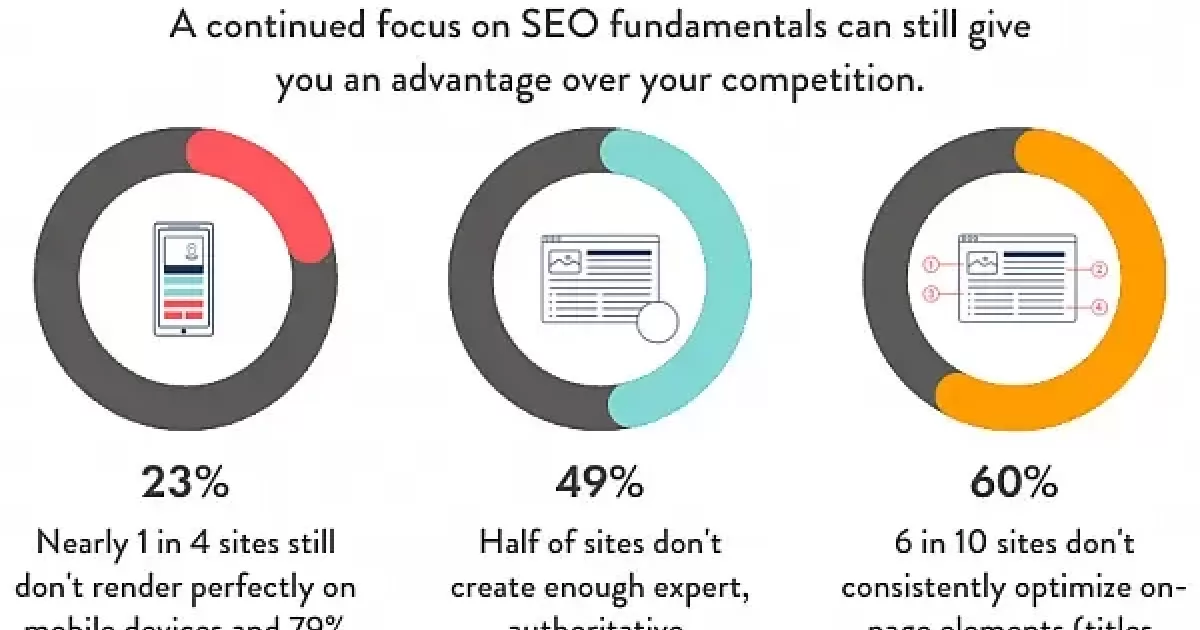Uncover the secrets to skyrocketing your financial firm’s online presence with these game-changing SEO strategies that actually work.

Image courtesy of via DALL-E 3
Table of Contents
Introduction: Understanding SEO
In today’s digital age, the online presence of businesses, including financial firms, plays a crucial role in attracting customers. One key tool that helps businesses improve their visibility on the internet is SEO, or Search Engine Optimization.
What is SEO?
SEO is like a magic wand that helps websites appear higher in search engine results when people look for something online. It involves using specific techniques to make sure that a website is easily found by search engines like Google or Bing.
Why is SEO Important for Financial Firms?
For financial firms, having a strong online presence is essential for attracting new clients and staying competitive in the market. By using SEO strategies, financial companies can ensure that their website ranks higher in search results, making it easier for potential customers to find them.
Researching Keywords
In the world of SEO, keywords are like secret codes that help search engines like Google understand what your website is all about. They are the words or phrases people type into search engines when looking for information, products, or services. By using the right keywords on your website, you can help your target audience find you more easily.
How to Find the Best Keywords
Researching keywords for your financial services firm is crucial for attracting the right visitors to your site. There are helpful tools available, such as Google’s Keyword Planner, SEMrush, and Moz Keyword Explorer, that can assist you in finding the most relevant and popular keywords in your industry.
Start by brainstorming words and phrases that are related to your services, then use these tools to see how often people search for them. Look for keywords with high search volume and low competition to increase your chances of ranking well on search engine results pages.
On-Page SEO
When it comes to optimizing your financial firm’s website for search engines, on-page SEO plays a crucial role in improving your online visibility. By focusing on the content and structure of your web pages, you can enhance your site’s relevance and user experience. Let’s delve into the key on-page SEO practices that can help your financial website rank higher in search engine results.

Image courtesy of via Google Images
Creating Quality Content
Quality content is king when it comes to on-page SEO. Search engines prioritize websites that provide valuable and relevant information to users. Make sure your content is well-written, informative, and tailored to your target audience. By producing high-quality articles, blog posts, and guides related to financial services, you can attract more visitors and increase your search engine rankings.
Using Meta Tags
Meta tags are snippets of text that describe the content of a web page. By optimizing your meta tags with relevant keywords, you can improve your website’s visibility in search results. Make sure to include your target keywords in the title tag, meta description, and meta keywords tag. This will help search engines understand the purpose of your page and rank it accordingly.
Organizing with Headings
Headings are essential for organizing your content and making it more readable for both users and search engines. Use heading tags (such as H1, H2, H3) to structure your web pages logically. Your main heading (H1) should clearly indicate the topic of the page, while subheadings can break down the content into smaller sections. This hierarchical structure not only improves the user experience but also helps search engines understand the context of your content.
Technical SEO
Website speed is how quickly your website loads when a user clicks on a link to visit it. It is crucial for providing a positive user experience and can impact your SEO rankings. Search engines like Google consider site speed when determining where to rank your website in search results. To improve your website speed, you can optimize images, enable browser caching, minify CSS and JavaScript files, and consider upgrading your hosting plan to a faster server.
Ensuring Mobile-Friendliness
Mobile-friendly design means that your website is accessible and user-friendly on mobile devices like smartphones and tablets. With the increasing use of mobile devices to browse the internet, having a mobile-friendly website is essential for both user experience and SEO. Google prioritizes mobile-friendly websites in search results, so make sure your site is responsive and adjusts to different screen sizes. Test your website on mobile devices to ensure it is easy to navigate and loads quickly on smaller screens.
Easy Site Navigation
Organized navigation on your website helps users find the information they need quickly and easily. Clear navigation menus and a logical hierarchy of pages make it simple for visitors to navigate through your site and find what they are looking for. From an SEO perspective, user-friendly navigation also helps search engines to crawl and index your website more effectively, improving your chances of ranking higher in search results. Consider using descriptive menu labels, internal linking, and a sitemap to enhance the navigation experience for users and search engines alike.
Off-Page SEO
Backlinks are like digital recommendations from one website to another. They are important for SEO because search engines see them as a sign that your website is trustworthy and valuable. To get quality backlinks, you can reach out to other websites in the financial industry and ask them to link to your content. You can also create valuable and shareable content that other websites will want to link to.

Image courtesy of via Google Images
Leveraging Social Media
Social media platforms like Facebook, Twitter, and LinkedIn can be powerful tools for improving your SEO. By sharing your website’s content on social media, you can drive traffic to your site and increase your visibility online. Make sure to engage with your followers and encourage them to share your content with their networks.
Building Relationships
Networking within the financial industry is essential for building credibility and improving your SEO. By forming relationships with other professionals, you can attract more backlinks to your site, gain more social media engagement, and even collaborate on content. Building relationships can also lead to valuable opportunities for guest posting, which can further boost your SEO.
Content Marketing
Content marketing is a powerful tool that financial firms can use to boost their online presence and improve their search engine optimization (SEO). By creating valuable and engaging content, companies can attract more traffic to their websites and establish themselves as industry leaders. Let’s dive into the different aspects of content marketing that can benefit financial firms.
Writing Blog Posts
One effective way for financial firms to engage with their audience and improve SEO is through writing informative blog posts. These posts can cover a range of topics, from investment strategies to financial planning tips. By consistently publishing high-quality content, companies can demonstrate their expertise and attract readers who are interested in their services.
Creating Videos
Videos have become increasingly popular in the digital world, making them a valuable tool for financial firms looking to enhance their SEO. Creating videos that explain complex financial concepts in a simple and engaging manner can help companies connect with their audience on a more personal level. Additionally, videos can improve a website’s visibility online, especially on platforms like YouTube.
Designing Infographics
Infographics are visually appealing tools that can simplify complex information and make it easier for readers to understand. For financial firms, creating infographics that explain market trends, investment strategies, or financial planning tips can be highly effective in attracting and retaining the attention of their target audience. These visual assets can also be easily shared on social media, further extending their reach.
Monitoring and Analytics
Setting SEO goals is crucial for measuring the success of your SEO strategies. These goals should be specific, measurable, achievable, relevant, and time-bound. For example, you might aim to increase organic website traffic by 20% within six months. By setting clear objectives, you can track your progress and make informed decisions to enhance your SEO performance.

Image courtesy of via Google Images
Using Analytics Tools
Analytics tools are essential for monitoring and analyzing your website’s performance. Tools like Google Analytics provide valuable insights into your site’s traffic, user behavior, and conversion rates. By regularly reviewing these metrics, you can identify areas for improvement and adjust your SEO tactics accordingly.
Understanding SEO Metrics
There are several key SEO metrics that you should pay attention to when evaluating your website’s performance. These include organic traffic, bounce rate, click-through rate (CTR), conversion rate, and keyword rankings. By understanding these metrics, you can assess the effectiveness of your SEO efforts and make data-driven decisions to optimize your site further.
Local SEO for Financial Firms
When it comes to optimizing your financial firm’s online presence for local searches, local SEO plays a crucial role. Local SEO focuses on improving your visibility in local search results, making it easier for potential clients in your area to find you. Here are some key strategies to enhance your local SEO:
Optimizing Google My Business
Google My Business is a powerful tool that allows you to manage how your business appears on Google Search and Maps. To optimize your Google My Business listing, make sure to provide accurate and up-to-date information about your financial firm, including your address, phone number, business hours, and services offered. Additionally, encourage satisfied clients to leave positive reviews, as these can significantly impact your local search rankings.
Managing Local Listings
Aside from Google My Business, it’s essential to ensure your financial firm’s information is consistent across all online directories and local listings. Make sure your name, address, and phone number (NAP) are accurate and consistent everywhere your business is listed. This consistency builds trust with search engines and customers alike, improving your local SEO performance.
Encouraging Customer Reviews
Customer reviews have a significant influence on local SEO. Positive reviews not only boost your credibility but also signal to search engines that your financial firm is a trusted and reputable business. Encourage satisfied clients to leave reviews on Google My Business, Yelp, and other relevant platforms. However, remember to respond to reviews, whether positive or negative, as it shows that you value customer feedback and engagement.
Conclusion: Putting It All Together
In the world of digital marketing, utilizing effective SEO strategies is crucial for financial firms to improve their online visibility and attract potential clients. By implementing a comprehensive SEO plan, financial companies can ensure that their websites rank higher on search engine results pages, ultimately leading to increased web traffic and conversions.

Image courtesy of via Google Images
Importance of SEO Strategies for Financial Firms
SEO strategies are not just about optimizing individual web pages; they encompass a holistic approach to improving a website’s overall performance. By focusing on researching and targeting the right keywords, creating quality content, optimizing technical aspects, building a strong off-page presence, engaging in content marketing, monitoring performance, and enhancing local SEO, financial firms can create a robust online presence that resonates with their target audience.
Key Takeaways
Remember, SEO is not a one-time task; it requires continuous monitoring and adjustment to stay ahead in the digital landscape. Keep track of key SEO metrics, set achievable goals, and adapt your strategies based on analytics. By staying up-to-date with industry trends and best practices, financial firms can ensure long-term success in their online marketing efforts.
In conclusion, a well-rounded SEO strategy is essential for financial firms looking to establish a strong digital presence and stand out in a competitive market. By following the guidelines outlined in this guide and consistently improving your SEO practices, you can effectively reach and engage with your target audience, driving growth and success for your business.
Frequently Asked Questions (FAQs)
What is SEO?
SEO stands for Search Engine Optimization. It is a way for financial firms to improve their visibility on search engines like Google. By using specific strategies and techniques, companies can increase the chances of their website showing up higher in search results when someone looks for financial services online.
Why is SEO Important for Financial Firms?
SEO is crucial for financial firms because it helps them attract more clients and grow their business. By optimizing their website with relevant keywords and high-quality content, companies can reach a larger audience and stand out from competitors. This can ultimately lead to increased website traffic, more inquiries, and higher chances of converting visitors into customers.







